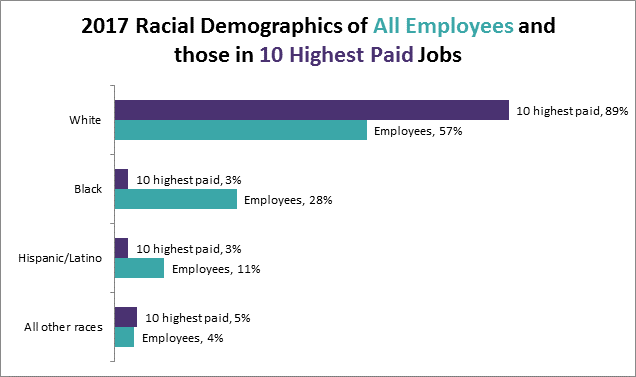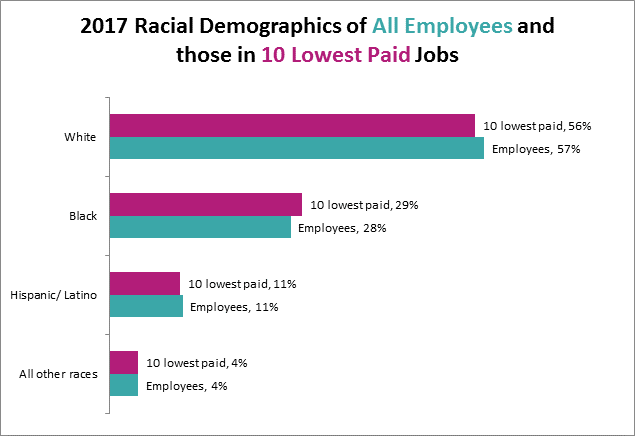For the past several years, TSNE has been looking at key trends in leadership, compensation, staff development and other areas that impact the resiliency of the nonprofit sector. Valuing Our Nonprofit Workforce compensation studies (2017, 2014 and 2010), Opportunity in Change (2017, with The Boston Foundation) and the Leadership New England report (2015) all point to the impact that low pay, long hours and little preparation for advancement are having on the nonprofit workforce.
In this new report, Wage Equity Matters, we have an opportunity to look closer at the data that relates to wage equity and racial and gender demographics. What we found are that white employees are still over-represented at the top, and wages for the lowest paid in our sector are inadequate. But while data helps us remain vigilant in identifying inequities, it should also spark a commitment to taking action to address the issues.
As we continue to think as a sector about how to create more diverse and inclusive organizations with people of color being recruited into leadership roles, it is important to look at who currently occupies the top jobs and what that means for the pipeline of leaders in our organizations.
The Executive Directors/CEOs of nonprofits who responded to our surveys have been more than 90% white since we began our survey in 2010. In our 2017 Valuing Our Nonprofit Workforce report, 91% of CEOs were white, even though 57% of employees were white. And only 4% of CEOs were Black, even though 28% of the employees represented by the survey are Black. Only 2% of the CEOs are Hispanic/Latino, while 11% of the employees are Hispanic/Latino.

In our 2017 compensation and benefits study, we see the same trend mirrored with the over-representation of white staff in the highest paid jobs. 89% of staff in the top 10 highest paid jobs are white, while all racial/ethnic demographics are proportionately represented in the lowest paid jobs.

Our recent survey data also points out that our sector does not always adequately support employees by paying living wages. 44% of our region’s nonprofit workers make less than $31,000, which could make them eligible for some public benefits in Massachusetts and Rhode Island. The cost of living is rising rapidly across our region and income inequality in our society is ever increasing. While many nonprofits have missions related to alleviating poverty and promoting well-being, many of our own nonprofit employees may be struggling to make ends meet with the low salaries in our sector. These inadequate wages particularly affect people of color, who are more likely to be in the lowest paid jobs in our sector.
This report is an important companion piece to the raw compensation data provided in the Valuing Our Nonprofit Workforce study. As we remind our consulting clients and all who use this compensation data, it is a snapshot of what nonprofit pay currently is, not what it should be. When interpreting the market data, it is critical for nonprofits to remember that the median wages for many roles may be inadequate, forcing nonprofit employees to work second jobs or make sacrifices in their standard of living. When reviewing compensation, nonprofit organizations need to consider not only the market but their own mission and values, as well as equity concerns. We hope that the data and suggestions in the report provide a useful focal point to begin or continue conversations about the equity impacts of human resources decisions.
